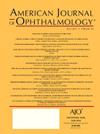Illness Uncertainty, Burden, and Capacity Among Caregivers of Children With Chronic Uveitis: A Stress and Coping Theory Perspective
IF 4.1
1区 医学
Q1 OPHTHALMOLOGY
引用次数: 0
Abstract
PURPOSE
The aim was to determine the relationships among illness uncertainty and caregiver burden and capacity in caregivers of children with chronic uveitis and to determine whether caregiver burden plays a mediating role in the relationship between illness uncertainty and caregiver capacity.
DESIGN
This was a cross-sectional study.
METHODS
The sample included 134 caregivers of children with chronic uveitis. All paper questionnaires were collected at a tertiary-level eye hospital in Wenzhou Province, China. Demographic and clinical characteristics and the Parents’ Perception of Uncertainty Scale (PPUS), Zarit Burden Interview (ZBI) and Family Caregiver Task Inventory (FCTI) scores were determined. IBM SPSS 26.0, AMOS 26.0 and GraphPad Prism 9.0.0 were used for figure preparation and statistical analyses.
RESULTS
Both the PPUS score (r = 0.725, P < .001) and ZBI score (r = 0.756, P < .001) were positively correlated with the FCTI score, indicating that higher levels of illness uncertainty and caregiver burden was significantly correlated with lower caregiver capacity. Illness uncertainty and caregiver burden (both P < .001) were found to be influencing factors of caregiver capacity. Furthermore, the effect of illness uncertainty on caregiver capacity was partly mediated by caregiver burden. The indirect effect was 0.366 (P = .012; 95% CI: 0.102, 0.879), accounting for 40.13% of the total effect.
CONCLUSIONS
Our findings revealed that both illness uncertainty and caregiver burden may reduce caregiver capacity among caregivers of children with chronic uveitis. Caregiver burden mediated the relationship between illness uncertainty and caregiver capacity in this population. Therefore, this study alerts health care providers to pay attention to illness uncertainty and caregiver burden, as these factors can help in developing effective interventions to improve caregiver capacity in clinical practice.
求助全文
约1分钟内获得全文
求助全文
来源期刊
CiteScore
9.20
自引率
7.10%
发文量
406
审稿时长
36 days
期刊介绍:
The American Journal of Ophthalmology is a peer-reviewed, scientific publication that welcomes the submission of original, previously unpublished manuscripts directed to ophthalmologists and visual science specialists describing clinical investigations, clinical observations, and clinically relevant laboratory investigations. Published monthly since 1884, the full text of the American Journal of Ophthalmology and supplementary material are also presented online at www.AJO.com and on ScienceDirect.
The American Journal of Ophthalmology publishes Full-Length Articles, Perspectives, Editorials, Correspondences, Books Reports and Announcements. Brief Reports and Case Reports are no longer published. We recommend submitting Brief Reports and Case Reports to our companion publication, the American Journal of Ophthalmology Case Reports.
Manuscripts are accepted with the understanding that they have not been and will not be published elsewhere substantially in any format, and that there are no ethical problems with the content or data collection. Authors may be requested to produce the data upon which the manuscript is based and to answer expeditiously any questions about the manuscript or its authors.

 求助内容:
求助内容: 应助结果提醒方式:
应助结果提醒方式:


